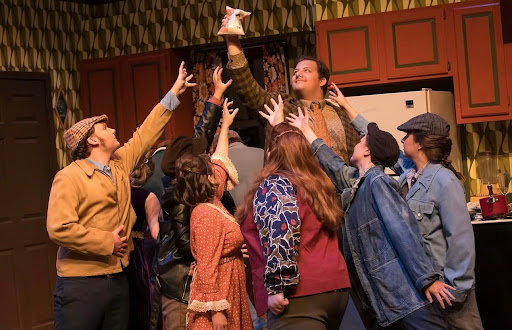The cast’s unity is reflected in their mission towards a common goal. Photo courtesy of Butler Theatre.
TORI SATCHWELL | STAFF REPORTER | tsatchwell@butler.edu
The Butler Theatre Department continues to tackle heavy themes through the art of live performance. Spanning from Wednesday, Oct. 9 to Sunday, Oct. 13, their latest show “They Don’t Pay? We Won’t Pay!” utilized comedy to underscore the current political climate. By engaging with each other and the audience, Butler Theatre created a unique sense of connection.
Following protagonist Antonia after she and other fed-up Italian citizens raid a local grocery store in response to prices doubling overnight, the play breaks into an all-out comedic farce. The situation spirals as Antonia’s best friend Margherita fakes a pregnancy to cover Antonia’s tracks, Antonia’s dim-witted yet law-abiding husband Giovanni is unaware of her rebellion and Margherita’s husband Luigi is as confused as ever. With a witty ensemble playing multiple characters, the play unravels into two hours of pandemonium.
Originally written in 1974, the initial iteration of the show was titled “Can’t Pay? Won’t Pay?”. Set in Italy during the 1970s, the play originally commented on themes of inflation, food insecurity and housing precarity during the time period.
While the main four characters are entertaining, the unity of the ensemble solidified the humor. Throughout the show, the ensemble embodied many roles, such as the Pope, the fictional Saint Eulalia or the undertaker. When they were not performing, they were still seated on the side of the stage and fully engaged in the story.
Emily Wilson and Jos Houben, the co-directors for the show, believed in making the rehearsal process as collaborative as possible. They encouraged students in any role to contribute ideas to integrate them into the story’s expansion.
“Even those who had less lines proposed a lot of material,” Wilson said. “A lot of the [gags] came from them, which was very rewarding for us.”
Houben and Wilson are part of the Christel DeHaan Visiting International Artists series, which brings internationally acclaimed directors to Butler’s campus. Their new perspectives allowed Butler students to expand their acting abilities and the theatre department to continue evolving.
Sophomore theatre major Kaleb Kiester believed that Houben and Wilson’s worldly experience granted the show a new level of depth.
“[Butler Theatre] tries to take on projects that are very diverse,” Kiester said. “We don’t like to stick to one specific idea, trope or genre. We bring in lots of people from around the world to present those ideas and shows. [Houben and Wilson] are coming from very different perspectives that make the show a very enriching experience, especially for the audience.”
With past projects ranging from “We are Proud to Present,” a dramedy about the genocide of the Herero of Namibia to “Men in Boats,” a comedy about the exploration of the Grand Canyon, the Butler Theatre department continues to diversify their material. However, one common thread connects them all: the desire to address issues within current society.
Senior acting major Gillian Flatt believes the political satire’s themes can easily be seen in today’s state of economic unrest.
“They resonate a lot because so many of the themes directly translate to what we’re going through now globally,” Flatt said. “This is the reality of the world we live in right now: people getting laid off, not having food, not having a stable income or housing. We see that every single day.”
“They Don’t Pay? We Won’t Pay!” emphasized the disparities within society through its genre. The show is a comical farce, meaning that it over-exaggerates every moment.
After watching the show, senior health sciences major Ellie Cornn believed the comedic elements made the experience memorable.
“I had never been to a show at Butler, but I really liked [this show],” Cornn said. “I thought it was so funny. I loved the grand humor; it made a lot of [difficult] and major topics more light-hearted and enjoyable.”
Comedy and laughter allow for a relaxed way to enter into serious conversations. The show used slapstick comedy to confront audiences with the truth of their situation.
Houben believed that comedy grants people a sense of unity and opens the door to meaningful, productive conversations.
“This type of comedy is very universal,” Houben said. “The message is one thing, but unconsciously, they laugh at the same moment, at the same time. Something happens in a group of people when they laugh together. Only comedy can bring a certain wisdom; it brings opposites together.”
Sometimes, theater is the best way to convey difficult conversations. This show created a sense of community in the audience by allowing people to experience emotions alongside each other, which promotes a sense of unity rather than division.



